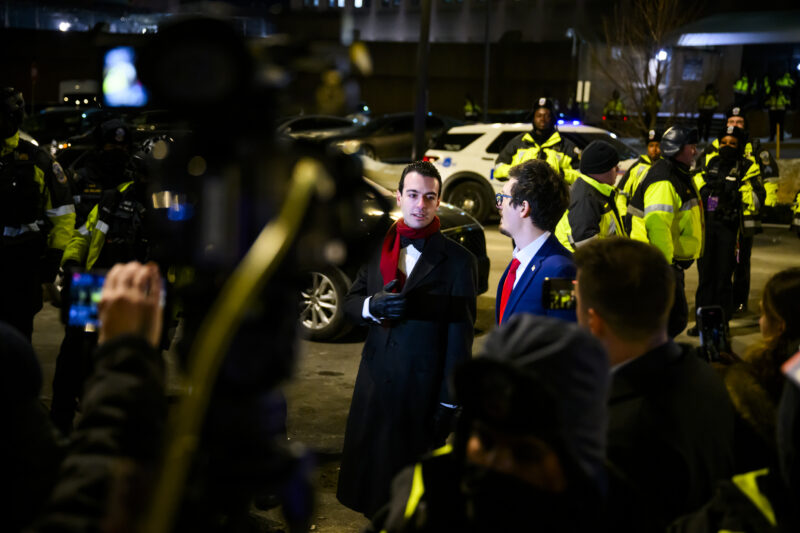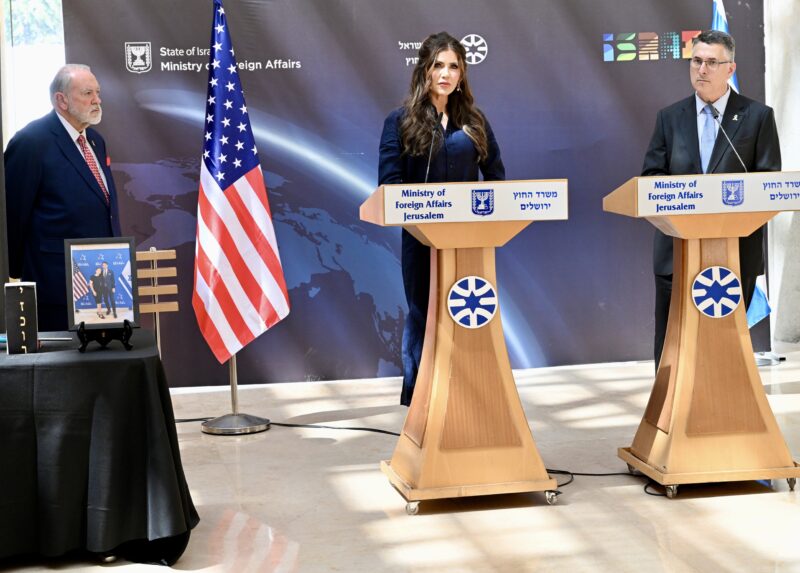
Daily Kickoff: Inside Israel’s visa waiver push + The return of the rugelach
👋 Good Wednesday morning!
Ed note: Enjoy the long Thanksgiving weekend. The Daily Kickoff will be off Thursday and Friday. Gobble Gobble!
A federal jury in Charlottesville, Va., awarded more than $25 million in damages to counterprotesters who experienced physical and psychological harm at the violent Unite the Right rally that occurred in the city in 2017.
The defendants in the civil trial include prominent white nationalists such as Richard Spencer and Andrew Anglin, the founder of the neo-Nazi Daily Stormer website. The largest damages were awarded against James Fields, who is serving multiple life sentences for murdering a counterprotester with his car.
“We feel that justice was served today,” Karen Dunn, one of the lead attorneys in the case, said at a press conference. “There is going to be accountability for the people who did this.” The jury found that the defendants violated Virginia civil rights statutes, but the jury could not reach a decision on two federal conspiracy charges related to violent race-based conspiracies.
“The general lack of accountability in the aftermath of Unite the Right is really why we believe this case is so important,” Amy Spitalnick, executive director of Integrity First for America, the organization behind the lawsuit, told Jewish Insider’s Limited Liability Podcast last week. “What became crystal clear in the days after the violence is that what happened was no accident, but rather it was planned meticulously in advance on social media.”
Israel’s Defense Minister Benny Gantz traveled to Morocco yesterday evening, the first formal visit by an Israel defense chief to the country. “This is an important and historic visit,” Gantz told the press before boarding his flight. During his visit, Gantz is set to sign several cooperation agreements with Moroccan defense officials. Today he signed a defense cooperation memorandum of understanding with his Moroccan counterpart Abdellatif Loudiyi.
flight path
Inside Israel’s push to join U.S. Visa Waiver Program

Yemina political party representative, Former Minister of Justice Ayelet Shaked leaves after a meeting with President Reuven Rivlin at the President’s residence on April 5, 2021 in Jerusalem, Israel. The country’s political leaders are meeting with President Reuven Rivlin to recommend who should be the next prime minister, with a mandate for forming a governing coalition.
When it comes to visiting the United States, Israelis often feel like the proverbial child: Nose pressed up against the window of the candy store: so near, yet so far. Unlike entry to Europe and most countries in Asia, to visit the country government officials like to refer to as their closest and most strategic ally, Israeli citizens must obtain a visa — a bureaucratic and burdensome process that most visitors to Israel remain totally oblivious to. Now, with wait times for U.S. visas topping more than a year, Israeli leaders, including Prime Minister Naftali Bennett, are stepping up efforts to get the Jewish state included in a special Visa Waiver Program that allows 90-day visa-free tourist and business visits. And, they are hopeful it could happen as soon as 2023, Jewish Insider’s Ruth Marks Eglash and Gabby Deutch report.
Biden’s commitment: Bennett discussed the issue during a meeting with President Joe Biden last August in Washington, D.C. The president said at the time that he was committed to “working together towards Israel’s inclusion in the Visa Waiver Program.” Last week, while in the U.S., Israeli Interior Minister Ayelet Shaked emphasized the matter to her counterpart, Homeland Security Secretary Alejandro Mayorkas. He later tweeted, “DHS remains committed to working with Israel to help it meet all Visa Waiver Program requirements.”
Overcoming barriers: Shaked, who served as justice minister from 2015-2019, told JI she was confident Israel would be able to overcome the barriers. She said representatives from her ministry will now meet once a month, virtually, with counterparts at DHS to iron out specifics such as sharing data and addressing problems faced by U.S. citizens of Palestinian descent. “On a professional level I know what needs to be done in Israel,” Shaked added, highlighting that both Mayorkas and incoming U.S. Ambassador to Israel Tom Nides, with whom she also met during her visit, “really want this to happen.”
Politically popular: “Israelis look at other countries who are in the program and say, ‘Why not us?’” former Israeli Ambassador to the U.S. Michael Oren, who served in Washington from 2009-2013, told JI. “They want to go to the U.S. to travel or study. Many have family connections. Politically this would be very popular in Israel,” added Oren, who says he also worked intensely on the issue during his tenure. “I used to tell my staff, ‘Whoever does this, they will erect a statue to them in Dizengoff Square.’”
Important for Israelis: Scott Lasensky, a senior adviser to former U.S. Ambassador to Israel Daniel Shapiro, told JI that the visa issue “looms large for Israelis,” while “Americans, including American Jews, are nearly blind toward it.” Lasensky added, “It has really outsized impacts on certain segments of Israeli society, thousands of people who work in certain industries, anyone who’s working with the Diaspora, especially North American Jewry.”





































